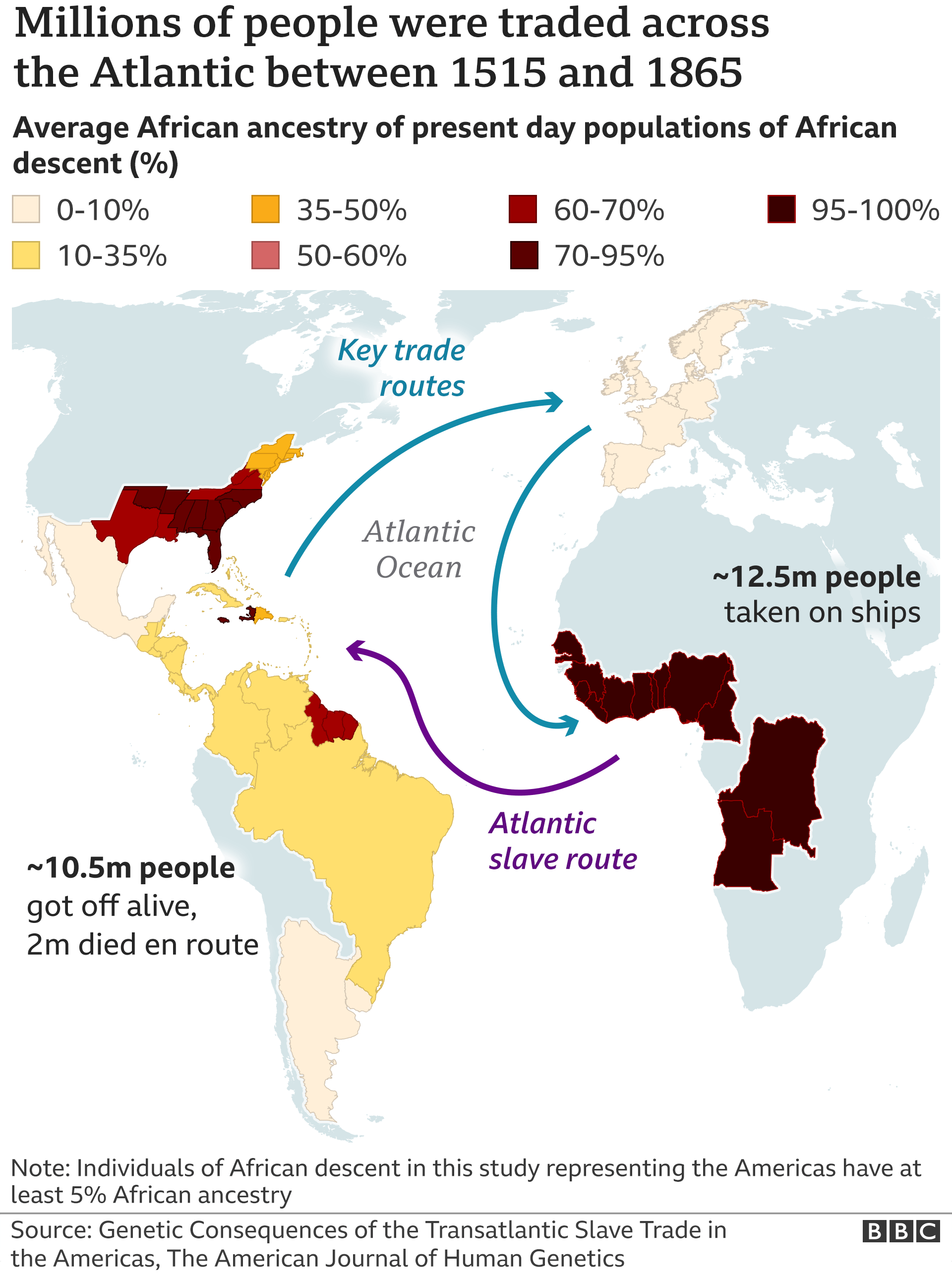Uchiha God
Veteran
A major DNA study has shed new light on the fate of millions of Africans who were traded as slaves to the Americas between the 16th and 19th centuries.
More than 50,000 people took part in the study, which was able to identify more details of the "genetic impact" the trade has had on present-day populations in the Americas.
It lays bare the consequences of rape, maltreatment, disease and racism.
The DNA study was led by consumer genetics company 23andMe and included 30,000 people of African ancestry on both sides of the Atlantic. The findings were published in the American Journal of Human Genetics.
The study found, in line with the major slave route, that most Americans of African descent have roots in territories now located in Angola and the Democratic Republic of Congo.
What was surprising was the over-representation of Nigerian ancestry in the US and Latin America when compared with the recorded number of enslaved people from that region. Researchers say this can be explained by the "intercolonial trade that occurred primarily between 1619 and 1807". They believe enslaved Nigerians were transported from the British Caribbean to other areas, "presumably to maintain the slave economy as transatlantic slave-trading was increasingly prohibited".

In another gruesome discovery, the study found that the treatment of enslaved women across the Americas had had an impact on the modern gene pool.
Researchers said a strong bias towards African female contributions in the gene pool - even though the majority of slaves were male - could be attributed to "the rape of enslaved African women by slave owners and other sexual exploitation".
In Latin America, up to 17 African women for every African man contributed to the gene pool. Researchers put this down in part to a policy of "branqueamento", racial whitening, in a number of countries, which actively encouraged the immigration of European men "with the intention to dilute African ancestry through reproduction".
Although the bias in British colonised America was just two African women to one African man, it was no less exploitative.
The study highlighted the "practice of coercing enslaved people to having children as a means of maintaining an enslaved workforce nearing the abolition of the transatlantic trade". In the US, women were often promised freedom in return for reproducing and racist policies opposed the mixing of different races, researchers note.
[SOURCE]
Funny enough, I posted this only a couple weeks ago:
More than 50,000 people took part in the study, which was able to identify more details of the "genetic impact" the trade has had on present-day populations in the Americas.
It lays bare the consequences of rape, maltreatment, disease and racism.
The DNA study was led by consumer genetics company 23andMe and included 30,000 people of African ancestry on both sides of the Atlantic. The findings were published in the American Journal of Human Genetics.
The study found, in line with the major slave route, that most Americans of African descent have roots in territories now located in Angola and the Democratic Republic of Congo.
What was surprising was the over-representation of Nigerian ancestry in the US and Latin America when compared with the recorded number of enslaved people from that region. Researchers say this can be explained by the "intercolonial trade that occurred primarily between 1619 and 1807". They believe enslaved Nigerians were transported from the British Caribbean to other areas, "presumably to maintain the slave economy as transatlantic slave-trading was increasingly prohibited".

In another gruesome discovery, the study found that the treatment of enslaved women across the Americas had had an impact on the modern gene pool.
Researchers said a strong bias towards African female contributions in the gene pool - even though the majority of slaves were male - could be attributed to "the rape of enslaved African women by slave owners and other sexual exploitation".
In Latin America, up to 17 African women for every African man contributed to the gene pool. Researchers put this down in part to a policy of "branqueamento", racial whitening, in a number of countries, which actively encouraged the immigration of European men "with the intention to dilute African ancestry through reproduction".

Although the bias in British colonised America was just two African women to one African man, it was no less exploitative.
The study highlighted the "practice of coercing enslaved people to having children as a means of maintaining an enslaved workforce nearing the abolition of the transatlantic trade". In the US, women were often promised freedom in return for reproducing and racist policies opposed the mixing of different races, researchers note.
[SOURCE]
Funny enough, I posted this only a couple weeks ago:
This is a common misconception. Most people think majority of slaves in the US came from Ghana or Nigeria when in reality they came from west central Africa, mainly Angola and Congo.
Here:
since people are speaking of origins, this a good thread to repost this:


most people in places like the USA, and even Brazil, are of Angolan and Congolese descent. the West Central region of Africa got hit the hardest and accounts for the majority of slaves in North America.

 the day that fakkitry like this goes away
the day that fakkitry like this goes away


